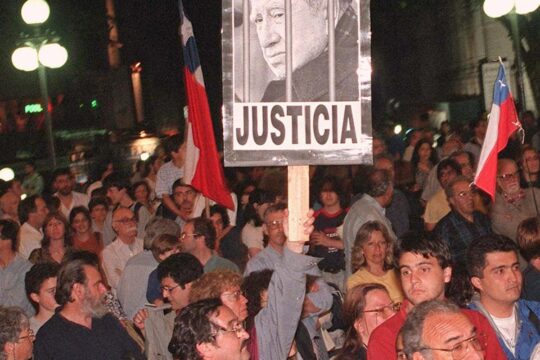Pope Francis met alone Tuesday with a small group of victims of sexual abuse by priests in Chile, after he publicly asked for forgiveness and riot police broke up a protest near the first public mass of his South American visit.
During the "strictly private" meeting at the Vatican's Apostolic Nunciature embassy in Santiago, the victims "spoke of their suffering to Pope Francis, who listened to them and prayed and cried with them," the Vatican said.
Earlier, the 81-year-old pontiff said: "I cannot begin to express the pain and shame that I feel over the irreparable harm caused to children by some ministers of the church," vowing to commit to ensure the abuses would never happen again.
Francis made those comments during a visit to President Michelle Bachelet's official Moneda Palace residence, drawing applause from pilgrims watching on giant screens in a Santiago park where he later celebrated an open-air mass for some 400,000 people.
But the pope did not receive a universal welcome, with scuffles breaking out between riot police and demonstrators in the vicinity of O'Higgins Park.
Police used armored vehicles to fire water cannons at the demonstrators, bundling some of them into vans. More than fifty people were arrested, authorities said.
- 'Pedophile accomplices' -
Many of the demonstrators chanted "pedophile accomplices" as they approached the park.
A man dressed as the pope and two other people dressed as nuns unfurled a banner from the balcony of a nearby building that read: "Francis, accomplice of pedophile crimes."
Under the 1973-1990 Augusto Pinochet military dictatorship, the church was admired for its human rights advocacy role. But today, Chile is the Latin American country most critical of the Vatican.
Francis's visit -- his first to Chile as pope -- has been overshadowed by a report outlining the depth of sexual abuse in the local church, and his appointment of a bishop who many here believe covered up the country's most prominent sex abuse scandal.
The US-based NGO Bishop Accountability said ahead of the visit that almost 80 Roman Catholic clergy members had been accused of sexually abusing children in Chile since 2000.
For some victims, the pope's request for forgiveness did not go far enough.
"We need concrete actions that the pope has not taken with the Chilean church," said Juan Carlos Claret, spokesman for a lay association in the southern city of Osorno.
Claret's group is demanding Francis remove Osorno bishop Juan Barros, whom he appointed in 2015, despite Barros's ties to a disgraced pedophile priest Fernando Karadima.
- A heavy price -
The pope later told representatives of Chile's clergy at a packed Santiago cathedral that he was "attentive to what you are doing to respond to this great and painful evil."
The pain was shared not only by victims and their families, he told them, but also by the clergy.
"I know that at times you have been insulted in the metro or walking in the street, and that by going around in clerical attire in many places, you pay a heavy price," Francis said.
"Have the courage to ask to be pardoned," he said.
In his homily at the mass, where the congregation included Mapuche women in traditional dress, Francis called for the rights and culture of indigenous people to be respected, so they could be treated as "a worthy child of this country."
Earlier, he said in his speech to officials that indigenous peoples "can make a great contribution" to the environmental protection of the planet.
"We can learn from them that there is no true development in a population that turns its back on the earth and everyone and everything around it," he said.
However, there was no specific mention of the Mapuche, with whom the pope is scheduled to meet Wednesday during a visit to Temuco, over 600 kilometers (370 miles) south of the capital Santiago.
Three Catholic churches were vandalized on Tuesday, including one in the Araucania region, where most of the Mapuche people live.
In a first for Francis, he visited a women's prison, telling inmates at Santiago's San Joaquin Female Penitentiary that "losing our freedom does not did not mean losing our dreams and hopes."
About 100 inmates welcomed him with songs and excited applause, some of them with their small children.
A jail sentence must offer opportunities for personal growth, he said.
"Public order must not be reduced to stronger security measures, but should be concerned primarily with preventive measures, such as work, education, and greater community involvement."



